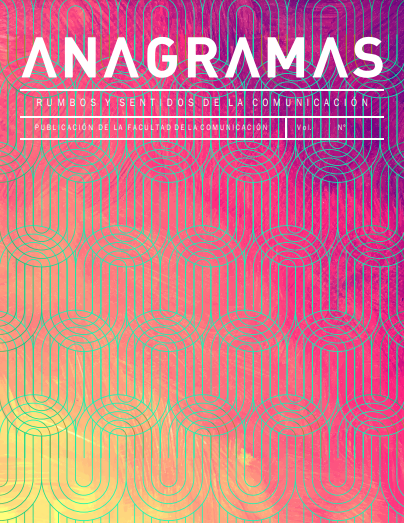Mass Media and Digital Media: Remassification and Internetization Remassification and Internetization
Main Article Content
Abstract
It is intended to observe in this article how the replacement of the hegemony of the mass media by digital media would be producing, instead of valuing the diversity of information, a remassification of contents: internetization. In this way, the human enlightenment and freedom promised by the technology revolution, it seems that it is just recreating the process of Cultural Industry and massification. For this reflection, concepts from the Theory of Media will be used, opposed by the ideas of the Frankfurt School. Although they are theories of different positions and policies, it is hoped that the opposition of these very antithetical thoughts can develop a reflection that points to the synthesis of the question that populates Late Modernity: is the massification process remaining in a past where the means of mass communication were hegemonic, or does the age of digital media still maintain this current process? Thus, from an exploratory research and based on a theoretical survey, it is intended to observe, from a functionalist view, that digital media seemed to indicate a revolution in communication processes, however, when observed through the bias of Theory Criticism of the Frankfurt School, the effects of alienation and massification seem to remain the same. Finally, Michel Foucault’s Archeology of Knowledge method, updated by Giorgio Agamben, in his book Signatura Rerun, added to Marshall McLuhan’s Theory of Means, opposed by the critical view of the Frankfurt School will be the method used for this reflection
Article Details
References
Adorno, T. e Horkheimer, M. (2000). Indústria Cultural: O Iluminismo como mistificação das Massas. In Lima, L. C. Teorias da Cultura de Massa. São Paulo: Paz & Terra, 2000.
Agamben, G. (2019). Signatura rerum. São Paulo: Boitempo.
Baitello, N. (2015). (A massa sem corpo), (o corpo sem massa), (a massa sem massa), (o corpo sem corpo. As redes sociais como ambientes de auseÌ‚ncia (e fundamentalismos). (in). Lopes, M. I. V. de, e, KUNSCH, M. M. K. (org.). Comunicação, cultura e miÌdias sociais. São Paulo: ECA-USP.
Bauman, Z. (1998). O Mal-Estar da Pós-Modernidade. Rio de Janeiro, RJ: Zahar.
CaÌdima, R. (2018). A rede na estrateÌgia da aranha: 'poÌs-verdade', poliÌtica e regressão. Observatorio. http://obs.obercom.pt/index.php/obs/article/view/1294.
Castro, J. C. L. (2021). Plataformas algoriÌtmicas e economia da desinformação. Estudos em Jornalismo
e MiÌdia, 18(2) jul./dez.
Dugnani, P. (2021). Massificação e internetilização: duas faces da mesma moeda no proceso de alienação pelos meios de comunicação. Revista Observatório, 7(4), a6en. https://doi.org/10.20873/uft.2447-4266.2021v7n4a6en
Dugnani, P. (2020). Pós-modernidade e comunicação: dos meios de massa aos meios digitais. Comunicação & inovação (ONLINE), 21, 129-146, DOI: https://doi.org/10.13037/ci.vol21n45.6201.
Foucault, M. (1990). As Palavras e as Coisas. São Paulo: Martins Fontes.
Hall, S. (2004). A Identidade Cultural na Pós-modernidade. Rio de Janeiro: DP&A.
Harari, Y. N. (2016). Homo Deus: Uma breve história do amanhã. Companhia das Letras. São Paulo.
Harvey, D. (1996). Condição Pós-Moderna. São Paulo: Loyola.
Lipovetsky. G. (2004). Os Tempos Hipermodernos. São Paulo: Barcarolla.
Levy, P. (2010). Cibercultura. São Paulo: Editora 34.
Lyotard, J. (2000). A Condição Pós-moderna. Rio de Janeiro: José Olympio.
Pereira, H. P., e Prates, V. (2022). Propagação do Vírus, Disseminação do Ódio: circulação dos afetos nas fake News sobre a covid-19. In Pereira, H. P., Prado, P. J. L. A., Prates, V. Comunicação em Rede na Década do Ódio. Barueri: Estação das Letras e Cores.
Rosa. H. (2019). Aceleração A transformação das estruturas temporais na Modernidade. São Paulo: Unesp.
Sevcenko, N. (2001). A Corrida para o século XXI. São Paulo: Companhia das Letras.
Silveira, S. A. (2017). Governo dos algoritmos. Revista de Políticas Públicas, [S. l.], v. 21, n. 1, p. 267- 282. DOI: 10.18764/2178-2865.v21n1p267-281. Disponível em: http://periodicoseletronicos.ufma.br/index.php/rppublica/article/view/6123.





